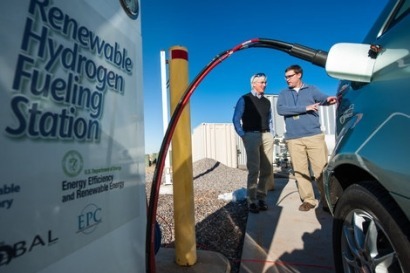
The scientists at NREL have taken a new approach to the PEC process, which uses solar energy to split water into hydrogen and oxygen via special semiconductors, the PEC materials and a number of catalysts to split the water. Previous research in this area has used precious metals such as platinum, ruthenium and iridium as catalysts attached to the semiconductors. However, using these metals as part of a large-scale commercial effort isn’t cost effective.
Cheaper molecular catalysts have been proposed instead of the precious metals, but there are problems with stability and they have a shorter lifespan than those of the metal-based catalysts. The NREL researchers examined molecular catalysts outside of the liquid solution they are normally studied in to see if they could attach the catalyst directly onto the surface of the semiconductor. Using this approach, they were able to put a layer of titanium dioxide (TiO2) on the surface of the semiconductor and bond the molecular catalyst to the TiO2 and found that molecular catalysts can be as highly active as the precious metal-based catalysts.
According to John Turner, a contributor to the study working with NREL's Chemistry and Nanoscience Center, although the molecular catalysts aren't as stable as the metal-based catalysts, PEC systems are shut down each evening as the sun sets. That leaves time to regenerate a molecular catalyst.
“Hopefully you would not have to do that every day, but it does point to the fact that low stability but highly active catalysts could be viable candidates as a long-term solution to the scalability issue for PEC water splitting systems” Mr Turner said.
The NREL research has been published in Nature Materials. The work was supported by the Department of Energy's Office of Science
For additional information:

